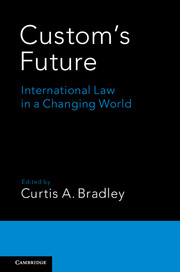Book contents
- Frontmatter
- Dedication
- Contents
- Notes on Contributors
- Introduction: Custom's Future
- 1 Custom's Past
- 2 Customary International Law Adjudication as Common Law Adjudication
- 3 Customary International Law as a Dynamic Process
- 4 Custom, Jus Cogens, and Human Rights
- 5 Customary International Law: How Do Courts Do It?
- 6 Custom's Method and Process: Lessons from Humanitarian Law
- 7 The Growing Obsolescence of Customary International Law
- 8 The Strange Vitality of Custom in the International Protection of Contracts, Property, and Commerce
- 9 The Decline of Customary International Law as a Source of International Criminal Law
- 10 Customary International Law and Public Goods
- 11 Reinvigorating Customary International Law
- 12 The Evolution of Codification: A Principal-Agent Theory of the International Law Commission's Influence
- 13 Custom and Informal International Lawmaking
- 14 Custom's Bright Future: The Continuing Importance of Customary International Law
- Bibliography
- Index
4 - Custom, Jus Cogens, and Human Rights
Published online by Cambridge University Press: 05 February 2016
- Frontmatter
- Dedication
- Contents
- Notes on Contributors
- Introduction: Custom's Future
- 1 Custom's Past
- 2 Customary International Law Adjudication as Common Law Adjudication
- 3 Customary International Law as a Dynamic Process
- 4 Custom, Jus Cogens, and Human Rights
- 5 Customary International Law: How Do Courts Do It?
- 6 Custom's Method and Process: Lessons from Humanitarian Law
- 7 The Growing Obsolescence of Customary International Law
- 8 The Strange Vitality of Custom in the International Protection of Contracts, Property, and Commerce
- 9 The Decline of Customary International Law as a Source of International Criminal Law
- 10 Customary International Law and Public Goods
- 11 Reinvigorating Customary International Law
- 12 The Evolution of Codification: A Principal-Agent Theory of the International Law Commission's Influence
- 13 Custom and Informal International Lawmaking
- 14 Custom's Bright Future: The Continuing Importance of Customary International Law
- Bibliography
- Index
Summary
Immanuel Kant notoriously declared that it was a “scandal of philosophy” that it had not yet furnished us with a convincing proof of the existence of an external world. International lawyers have their equivalent occupational scandal: the failure to achieve clarity or consensus on the nature of customary international law. Custom, after all, is arguably the most fundamental source of international law, at least insofar as treaty law is itself embedded within a customary framework. This framework includes various principles bearing on the interpretation of treaties and arguably also the grundnorm of treaty law, pacta sunt servanda. Indeed, the international lawyer's scandal goes deeper. All of us, philosophers or not, standardly proceed on the basis that a world external to our senses exists. By contrast, assertions about customary international law are largely confined to international lawyers, although their being taken seriously occasionally has real practical consequences for others.
It is not enough to respond to this state of affairs with a knee-jerk pragmatism: the shop-worn thesis that customary international law works well enough “in practice” and so requires no explication “in theory.” After all, this simply presupposes that we already know what customary international law is, and merely shifts attention to whether it “works.” In any case, it is doubtful that anything can satisfactorily “work” in a discursive and legitimacy-claiming practice if its very nature remains stubbornly opaque or conceptually problematic. Equally, we should not be put off by the skeptical dogma that all of our moral-political ideas are infected with contradictions at their very core, so that the search for an explanation that makes good sense of them is doomed from the outset. Even the alluring consolations of intellectual resignation need to be earned by argument rather than mere fiat.
In this chapter, by drawing on, clarifying, and extending previous work, I try to sketch the argument that the pragmatists and skeptics take to be either unnecessary or impossible. I offer a moral judgment-based account (MJA) of customary international law, one that challenges the orthodox idea that there is a deep connection between custom and consent, and I mobilize the ensuing account in relation to human rights norms in particular.
- Type
- Chapter
- Information
- Custom's FutureInternational Law in a Changing World, pp. 95 - 116Publisher: Cambridge University PressPrint publication year: 2016
- 9
- Cited by



